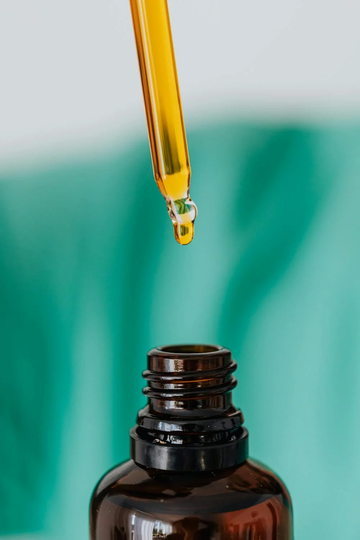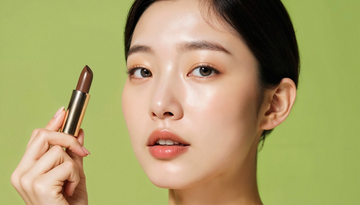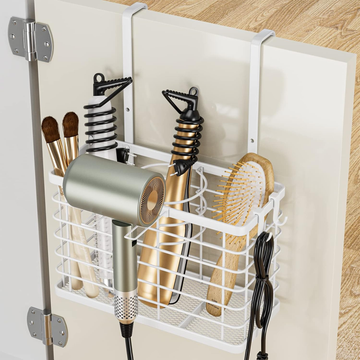Everything’s better in the summer, from longer days to more sunshine. And if you’ve felt like another benefit you’ve seen through the summer months is extra hair growth, you’re not alone. It’s a super common effect during those summer months, and a lot of people believe that summer’s magical mix of warmth and sunshine gives hair a much-needed boost.
But is there any truth to this popular notion, or is it just another sun-soaked beauty myth? We’re here to unpack this myth, find out how much truth there is to it, and ultimately help you figure out if hair really does grow faster in the summer. Spoiler alert: the answer might surprise you, and give you an excuse to spend even more time at the beach.
Why does my hair grow faster in the summer?
We’ll cut to the chase: does your hair actually grow faster in the summer? The short answer is, yes, it just might.
Summer's longer days and increased sunshine can stimulate hair follicles. Sunlight boosts your body's production of vitamin D, which plays a key role in hair growth. Plus, warmer weather can improve blood circulation to your scalp, delivering more nutrients to those follicles.
You might find the increased humidity during summer a bit annoying, but that moisture in the air during the summer months can also help your hair retain moisture, making it look and feel healthier. And let’s not forget how summer changes our daily routines. More outdoor activities and exercise can boost your overall health, which in turn can benefit your hair.
So, while summer isn’t a magical hair growth potion, the season’s environmental perks and your more active lifestyle can indeed give your hair growth a little nudge.
What other factors impact how fast my hair grows?
While summer might give your hair a bit of a boost, many other factors play a significant role in how quickly your hair grows. From what you eat to what you were born with, some of these factors are within your control and some aren’t.
Diet and nutrition: Just like the rest of your body, your hair needs the right nutrients to grow strong and healthy. Proteins, vitamins (like A, C, D, and E), and minerals (like zinc and iron) are crucial. Think of them as the building blocks your hair follicles need to produce healthy strands.
Genetics: Your DNA is a major player in determining your hair's growth rate, thickness, and overall health. If your parents had fast-growing hair, there’s a good chance you might, too. Unfortunately, if slow-growing hair runs in the family, you might be on that slower track as well.
Hormones: Hormonal changes can significantly impact hair growth. For instance, during pregnancy, many people experience thicker, faster-growing hair due to increased hormone levels. Conversely, hormonal imbalances, like the ones caused by thyroid issues or menopause, can slow down growth.
Age: Hair growth tends to slow as you age. The hair growth cycle becomes shorter, and hair follicles can shrink or stop producing new hair altogether. This is why many people experience thinning hair or hair loss as they get older.
Your hair care routine: How you treat your hair matters. Overusing heat tools, too many chemical treatments, or super tight hairstyles (sorry to the Bella Hadid-inspired slick back enthusiasts) can cause breakage and damage, making it seem like your hair isn't growing. Gentle handling, regular trims, and using the right products can help maintain healthy hair growth.
Scalp health: A healthy scalp is the foundation for healthy hair. Issues like dandruff, psoriasis, or excess oil can clog hair follicles and hinder growth. Regular scalp massages and keeping your scalp clean can improve circulation and overall hair health.
Stress levels: High stress can lead to hair loss conditions like telogen effluvium, where stress pushes hair follicles into a resting phase, causing hair to fall out more easily. Finding ways to manage stress through relaxation techniques, exercise, and hobbies can promote better hair health.
Medical conditions and medications: Certain health conditions, such as autoimmune diseases or chronic illnesses, and medications, including chemotherapy drugs, can affect hair growth. Always consult with a healthcare professional if you suspect a medical issue is impacting your hair.
By understanding and optimizing these factors, you can give your hair the best possible environment to grow long and strong, no matter the season.
How can I get my hair to grow faster every season?
Achieving healthy hair growth all year-round involves consistent care and smart strategies that cater to both your hair and scalp. Here's a season-by-season guide to keep your hair growing at its best.
Refresh and rejuvenate: How to get your hair to grow in the spring
Detox your scalp: Spring is a great time to rid your scalp of all that winter buildup. Use a gentle exfoliating scrub or a clarifying shampoo to remove excess oils and product residue.
Hydrate and condition: Winter dryness can leave your hair parched. Deep conditioning treatments, hydrating products, and leave-in conditioners can restore moisture and strength.
Trim regularly: Get rid of any split ends with a trim to promote healthier growth.
Protect and nourish: How to get your hair to grow in the summer
Shield from sun damage: Just like protecting your skin from harmful UV rays, you need to protect your hair, too, because the sun can damage and weaken it. Wear hats or use hair products with UV protection to safeguard it from sun damage.
Stay hydrated: Drink plenty of water to keep your hair hydrated from within. Hydrating masks can also help your hair maintain moisture levels.
Limit heat styling: Embrace natural styles to minimize heat damage. When you do use hot tools, always apply a heat protectant, and choose the best tools made with titanium and easy-to-use heat control to keep your strands healthy.
Rinse after swimming: Chlorine and saltwater can be harsh on hair. Rinse your hair with fresh water after swimming and use a clarifying shampoo to remove any residue.
Strengthen and prepare: How to get your hair to grow in the fall
Boost hair nutrition: As your diet changes with the season, make sure you’re getting plenty of hair-friendly nutrients like biotin, vitamin E, and omega-3 fatty acids. Eat things like salmon, avocado, and eggs to feed your hair from within.
Repair summer damage: Summer activities can leave hair damaged. Use strengthening treatments and protein masks to rebuild that hair structure and help it recover from those busy warmer months.
Gentle styling: With cooler temperatures, hair becomes more fragile. Opt for gentle hairstyles that don’t pull on the hair too much, and again, use top-quality hot tools that will minimize the potential for damage.
Protect and moisturize: How to get your hair to grow in the winter
Combat dryness: Indoor heating and cold outdoor air can dry out hair. Use rich, moisturizing shampoos and hydrating conditioners, and apply hair oils to lock in moisture. Do this at night and sleep on a silk pillowcase to help that moisture absorb into your strands and stay there.
Wear protective styles: Braids, buns, and other protective styles can help minimize exposure to the elements and reduce breakage.
Humidify your environment: Use a humidifier to add moisture to the air in your home, which can help prevent your hair from becoming too dry. It can also help the rest of your body stay hydrated and reduce the impact of things like seasonal allergies.
Year-round essentials for hair growth
Healthy diet: Maintain a balanced diet rich in vitamins, minerals, and proteins to provide your hair with the nutrients it needs to grow.
Gentle handling: Avoid harsh brushing or combing. Use wide-tooth combs and be gentle when detangling.
Regular trims: Get regular trims every eight to 12 weeks to prevent split ends from traveling up the hair shaft.
Scalp care: Keep your scalp clean and healthy. Regular scalp massages can improve blood circulation, promoting more hair growth.
Manage stress: Stress management techniques like yoga, meditation, and regular exercise can help maintain hormonal balance, which will benefit hair growth.
By tailoring your hair care routine to the specific challenges and opportunities each season presents, you can help your hair grow strong and healthy all year long.
If I can’t get my hair to grow, what other options do I have?
If you're struggling with hair growth despite your best efforts, there are several alternative options and treatments you can explore. Here’s a rundown:
- Topical treatments
Minoxidil: This over-the-counter treatment is FDA-approved for stimulating hair growth and slowing hair loss. It’s available in liquid or foam forms and should be applied directly to the scalp.
Essential oils: Oils like rosemary, peppermint, and lavender have been shown to promote hair growth. Mix a few drops with a carrier oil (like jojoba or coconut) and massage into your scalp regularly.
Scalp serums: These often contain ingredients like caffeine, peptides, and biotin, which can nourish the scalp and encourage hair growth.
- Prescription medications
Finasteride: This oral medication is often prescribed for male pattern baldness. It works by reducing the production of a hormone that shrinks hair follicles.
Spironolactone: Often used for women with hair loss, this medication helps by addressing hormonal imbalances that can cause hair thinning.
- Professional treatments
Platelet-Rich Plasma (PRP) therapy: PRP involves injecting your own platelet-rich plasma into your scalp to stimulate hair growth. It’s a newer treatment but has shown promising results.
Laser therapy: Low-level laser therapy (LLLT) can help stimulate hair follicles and improve hair density. Devices like laser combs and helmets are available for home use, or you can get treatments at a clinic.
Microneedling: This procedure involves tiny needles creating micro-injuries in the scalp, which can stimulate hair growth through increased blood flow and collagen production.
- Hair transplants
Follicular Unit Transplantation (FUT): This surgical procedure involves removing a strip of scalp and transplanting hair follicles to the thinning areas.
Follicular Unit Extraction (FUE): Individual hair follicles are harvested and transplanted, which can result in a more natural appearance with less scarring.
- Dietary supplements
Biotin: Often marketed for hair health, biotin supplements can help if you’re deficient in this vitamin.
Multivitamins: Ensure you’re getting essential vitamins and minerals like zinc, iron, vitamin D, and omega-3 fatty acids, which support hair growth.
- Wigs, hairpieces, and hair extensions
Synthetic wigs: Affordable and available in a variety of styles and colors. They require less maintenance but can have a less natural appearance.
Human hair wigs: More expensive but offer a natural look and feel. They can be styled with heat tools and colored, just like your own hair.
Hair extensions: Can add length and volume. Choose high-quality extensions and have them applied by a professional to avoid damage to your natural hair.
- Lifestyle changes
Stress management: High stress can impact hair growth. Incorporating things like yoga, meditation, and regular exercise into your daily routine can help reduce stress levels.
Proper hair care: Avoid harsh treatments and over-styling. Use gentle products, minimize heat exposure, and handle your hair with care to prevent breakage.
- Consultation with a specialist
Dermatologist or Trichologist: These specialists can diagnose underlying conditions that might be affecting hair growth and recommend appropriate treatments.
Exploring these alternatives can help you find a solution that works for your unique situation. Whether it’s through medical treatments, lifestyle changes, or cosmetic enhancements, there are plenty of options to help you achieve the look you want.
Get your best hair this summer
While the idea of hair growing faster in the summer holds some truth thanks to increased sunlight and improved blood circulation, there’s lots more to consider. From your diet, your genetics, your hormones, and the hair care routine you build, your hair growth can be influenced by so many different things.
But by understanding all those elements and implementing healthy hair habits year-round, you can give your hair the best chance to thrive, no matter the season. And if you find that your hair growth needs an extra boost, there are plenty of treatments and alternatives to explore. So embrace the summer sun, but remember, consistent care is the key to luscious locks all year long.





